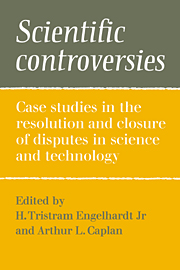 Scientific Controversies
Scientific Controversies Book contents
- Frontmatter
- Contents
- Preface
- List of contributors
- Introduction: Patterns of controversy and closure: the interplay of knowledge, values, and political forces
- PART I THEORETICAL PERSPECTIVES
- 1 Ethical theory and the problem of closure
- 2 Scientific controversy and its termination
- 3 The political anatomy of controversy in the sciences
- 4 Controversies involving science and technology: a theoretical perspective
- 5 Politics, public policy-making, and the process of reaching closure
- 6 The role of experts in scientific controversy
- 7 The continental drift debate
- 8 How history and politics affect closure in biomedical discussions: the example of the Soviet Union
- 9 Scientific disputes over policy
- 10 Controversies and the authority of science
- 11 Post-Skinner and post-Freud: philosophical causes of scientific disagreements
- PART II CONTEMPORARY CASE STUDIES
- PART III CONTROVERSY, CLOSURE, AND THE PUBLIC
- Author index
- Subject index
10 - Controversies and the authority of science
Published online by Cambridge University Press: 03 February 2010
- Frontmatter
- Contents
- Preface
- List of contributors
- Introduction: Patterns of controversy and closure: the interplay of knowledge, values, and political forces
- PART I THEORETICAL PERSPECTIVES
- 1 Ethical theory and the problem of closure
- 2 Scientific controversy and its termination
- 3 The political anatomy of controversy in the sciences
- 4 Controversies involving science and technology: a theoretical perspective
- 5 Politics, public policy-making, and the process of reaching closure
- 6 The role of experts in scientific controversy
- 7 The continental drift debate
- 8 How history and politics affect closure in biomedical discussions: the example of the Soviet Union
- 9 Scientific disputes over policy
- 10 Controversies and the authority of science
- 11 Post-Skinner and post-Freud: philosophical causes of scientific disagreements
- PART II CONTEMPORARY CASE STUDIES
- PART III CONTROVERSY, CLOSURE, AND THE PUBLIC
- Author index
- Subject index
Summary
Scientists have participated in a remarkable number of controversies during the past few decades. Some of these controversies revolve around technology. Legislation to control the environmental and health risks of technology calls for decisions based on “the best scientific evidence.” Government efforts to regulate advances in technology thus engage scientific experts in lively debate over the interpretation of data and the dimensions of risk. Other controversies relate to science itself. The disputes over recombinant DNA research, animal experimentation, in vitro fertilization, or fetal research have inevitably engaged scientists in political activism to protect their own interests.
Still other disputes, including many of those discussed in this volume, have little to do with science or technology at all. Abortion legislation, the decision to ban Laetrile, and the classification of homosexuality by the American Psychiatric Association as a mental disorder are fundamentally ethical, moral, or political issues. Yet, here too science is consistently invoked as the disputes unfold, reflecting the increasing tendency to rely on scientific standards as a basis for legal and policy decisions. Indeed, science is a political resource, called upon as a source of rationality and a basis of consensus in a wide range of policy areas.
Although access to expertise provides a means of legitimating decisions, it can also provide the ability to question them. Thus, controversial public policy questions invariably seem to evolve into scientific disputes, and difficult ethical dilemmas translate into debates over the adequacy and interpretation of evidence or the appropriateness of scientific methodologies.
- Type
- Chapter
- Information
- Scientific ControversiesCase Studies in the Resolution and Closure of Disputes in Science and Technology, pp. 283 - 294Publisher: Cambridge University PressPrint publication year: 1987
- 3
- Cited by


